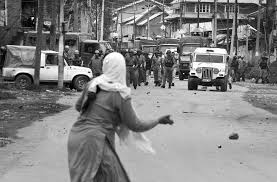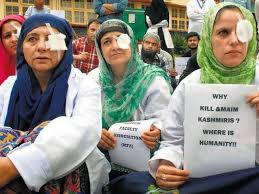Peace Watch » Editor's Take » The 100 Days ‘2016- Kashmir Intifada- an Analysis
The 100 Days ‘2016- Kashmir Intifada- an Analysis
The 100 Days Intifada’
Kashmir on International Turf
By
Z. G. Muhammad
 The ‘Intifada’-2016 has completed hundred days. In the seven-decade-old resistance movement of the State, it has been longest uprising – something unprecedented. Of the hundred days, every morning in 2214 villages of Kashmir and hundreds of mohallas and colonies of Srinagar, dawned with a new tragedy. Many horrid and horrendous stories of human rights abuses added to the blood-soaked Kashmir narrative. The year 2016, which New York Times has described as Kashmir’s year of “dead eyes” for blinding of children with pellets has exceeded the 2008 and 2010, Intifada so far magnitude of sufferings caused to people in general and children and youth, in particular, are concerned. Since 1931, the founding year of Kashmir struggle for freedom there is not a single instance of twelve thousand people suffering bullets and pellets, half of them disabled for life and fifteen thousand arrested in hundred days. There is no example of blinding children.
The ‘Intifada’-2016 has completed hundred days. In the seven-decade-old resistance movement of the State, it has been longest uprising – something unprecedented. Of the hundred days, every morning in 2214 villages of Kashmir and hundreds of mohallas and colonies of Srinagar, dawned with a new tragedy. Many horrid and horrendous stories of human rights abuses added to the blood-soaked Kashmir narrative. The year 2016, which New York Times has described as Kashmir’s year of “dead eyes” for blinding of children with pellets has exceeded the 2008 and 2010, Intifada so far magnitude of sufferings caused to people in general and children and youth, in particular, are concerned. Since 1931, the founding year of Kashmir struggle for freedom there is not a single instance of twelve thousand people suffering bullets and pellets, half of them disabled for life and fifteen thousand arrested in hundred days. There is no example of blinding children.
The newspapers have largely documented the human sufferings and economic losses suffered by the people during the period. Some young journalists have objectively and incisively reported from the surgical theaters and hospital wards and documented stories of unparalleled pain and agony. Some commentators analyzing the gains of the hundred days long ‘Intifada’ have concluded that it has worked as a catalyst for bringing in desired social change in the society- doing away with marriage extravaganza and strengthened the institutions of philanthropy. But, the common question that haunts the public mind is how far it has helped in furthering the cause at the diplomatic and political levels. To find an answer to this question, one needs to understand that if the 2016 uprising has left a greater impact on the international opinion than the months-long 2008 and 2010 uprisings. Lydia Polgreen, of the New York Times, was first to tell the world in 2010 that in Kashmir there was “an intifada-like popular revolt against Indian rule that includes not just angry young men but their sisters, mothers, uncles and grandparents.” After the early nineties, incidents like the Sopore carnage when scores were roasted alive and killed by troops in 2010 Kashmir problem once again made it to the print and the electronic media at international level. The uprising caused over 2000 reports, editorials and columns in the international press. For the first time, the killing of 116 teenagers in cold blood pricked the conscience of some important journalists and writers. One of the prominent Indian columnists wrote, “We promised Kashmiris a plebiscite six decades ago. Let us hold one now, and give them three choices: independence, union with Pakistan, and union with India.” And another opined, ““I reckon we should hold a referendum in the Valley. Let the Kashmiris determine their destiny. If they want to stay in India, they are welcome. But if they don’t, then we have no moral right to force them to remain.” It was not only the two that had broken the taboo, but there were many in the Indian civil society who held similar views. Notwithstanding, the uprising generating lots of opinion in New Delhi and internationally. It had failed both in 2008 and 2010 to get required diplomatic push at the international level more particularly at the United Nations for generating a strong discourse for the resolution of the Kashmir Dispute. Neither, Pakistan, one of the party to the Dispute, nor, any of the member country of the OIC that invariably in its meetings has been calling for holding of a plebiscite in Kashmir raised the Kashmir issue in the United Nations General Assembly or at any other international forum.
 Pakistan President Asif Zardari who succeeded General Mushraff, in his address to the UN General Mushraff in 2008 did not even mention Kashmir. For the killing of 117 children and teenagers in 2010, Shah Mehmood Qureshi, Minister Pakistan Foreign Minister, in his speech to the UN General Assembly made a brief mention of Kashmir. Condemning the killing of Kashmiri children stated that it was a dispute about the right of self-determination by the Kashmiri people through a free, fair and impartial plebiscite under United Nations auspices. Instead of calling for the implementation of the UN resolution he expressed Pakistan willingness to engage India in a comprehensive dialogue to normalize bilateral relations and amicably resolve all outstanding issues, including Jammu and Kashmir.” Notwithstanding, in 2010 the Kashmir getting as favorable an international press as in 1948 the Zardari government failed to understand as had rightly been pointed out by Polgreen of NY Times, ‘Kashmir’s demand for self-determination was sharper in 2008-2010 than it had been perhaps at any other time in the region’s troubled history.’
Pakistan President Asif Zardari who succeeded General Mushraff, in his address to the UN General Mushraff in 2008 did not even mention Kashmir. For the killing of 117 children and teenagers in 2010, Shah Mehmood Qureshi, Minister Pakistan Foreign Minister, in his speech to the UN General Assembly made a brief mention of Kashmir. Condemning the killing of Kashmiri children stated that it was a dispute about the right of self-determination by the Kashmiri people through a free, fair and impartial plebiscite under United Nations auspices. Instead of calling for the implementation of the UN resolution he expressed Pakistan willingness to engage India in a comprehensive dialogue to normalize bilateral relations and amicably resolve all outstanding issues, including Jammu and Kashmir.” Notwithstanding, in 2010 the Kashmir getting as favorable an international press as in 1948 the Zardari government failed to understand as had rightly been pointed out by Polgreen of NY Times, ‘Kashmir’s demand for self-determination was sharper in 2008-2010 than it had been perhaps at any other time in the region’s troubled history.’
The 2016, Intifada did not get as many international opinion columns and editorials as the 2010 uprising. Nevertheless, against 2010, with New Delhi denying the very existing of the problem, Kashmir is stealthily and steadily once again generating international interest. Stories like those in the Guardian and the New York Times on the use of pellet gun and ‘epidemic of dead eyes in Kashmir’ and sympathies in Pakistan metamorphosed Nawaz Sharif’s goody- goody Kashmir policy bordering on inertia. It was because of mounting anger in his country against the human rights situation in Kashmir that his address in UN General Assembly was Kashmir-centric. Moreover, he took some diplomatic initiatives and sent envoys across the globe for generating international opinion for the resolution of the sixty-nine-year-old dispute. In fact, Nawaz Sharif’s Kashmir policy has undergone a paradigm shift during past hundred days and has been endeavoring hard to bring Kashmir back on the international turf.
To see Kashmir- a nuclear flashpoint and threat to peace in South Asia resolved, it needs a bigger diplomatic push. The OIC Foreign Ministers Council (CFM) is Meeting in Tashkent on 18-19 October 2016 could be a forum that could play a catalytic role in generating required international opinion . Kashmir leaders from both the sides of the LOC are invited to the meeting- those leaders from our side of the LOC are all incarcerated. In its September 20, 2016, meeting the OIC Contact Group on Jammu and Kashmir on the sidelines of the UN General Assembly, in New York had after deliberation on Kashmir situation drafted a resolution for appropriate action at the CFM. It remains to be seen if Islamabad succeeds in mobilizing the 56- strong member country organization to grow beyond adopting a ritualistic resolution on Kashmir and making OIC as an organization to come out of inertia and mobilizing international opinion for the resolution of the Kashmir- the oldest dispute on the UN Agenda.
The article is published in Greater Kashmir on 17 Oct 2016
- Unfortunately some typos had persisted in the printed version due to oversighted.
Filed under: Editor's Take · Tags: Zahid G Muhammad








Kashmir unrest is not getting international publicity as was the case in 2010 or during militancy etc. But we must not mix up international publicity with international attention. These are two different things. World media both print and electronic is monopolised by zionists tycoons like MURDOCH etc. But there is another free media which doesn’t fall within their control that is internet and social media.
There have been detailed reportings and debates on all world tv channels about Kashmir problem. But looking at the level of misuse of state power and brutalities people are being subjected to and what people have been going through in months of curfews and shutdowns ,the coverage was expected to be larger, equally for the reason that it threatens world peace knowing the fact that the problem can degenerate in nuclear war between two nuclear neighbours.
There is one more reason which can be understood in shifting strategic alliance in the world. India, US, Israel have become strategic partners and American strategic interests shifted from middle east to far east, knowing the rising political, economic, and dominant military power of china.
The united nations did its duty towards kashmir while showing its honest willingness to help both countries to iron out their differences if asked. The point is that there is no initiative in security council to debate kashmir problem in view of pending resolutions on Kashmir, on its desk. The irresponsible political behaviour of people of kashmir and standing by traitors, their descendants and collaborators against all political logic has had direct bearing on the psyche of world powers present in security council.
As far as united nations human rights commission is concerned it equally did its job while asking access both to India and Pakistan to investigate human rights violations. Therefore, we can’t say kashmir intifada did not mobilize international opinion and international institutions.